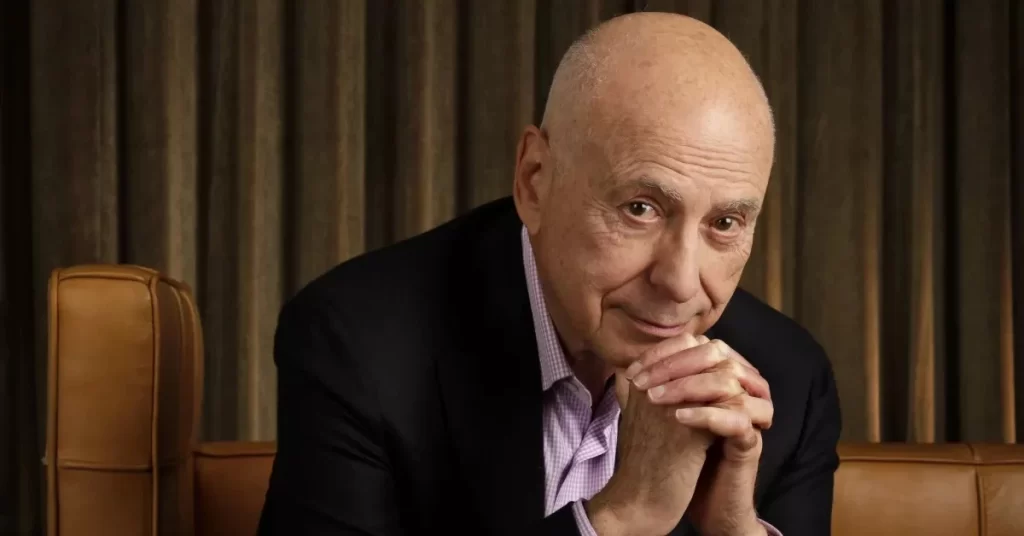Oscar Winning actor Alan Arkin, known for his diverse and accomplished career spanning seven decades, has passed away at the age of 89. His representative, Melody Korenbrot, confirmed his death to USA TODAY on Friday, and Arkin’s sons, Adam, Matthew, and Anthony, released a joint statement on behalf of the family, expressing their love for their father and recognizing his exceptional talents as both an artist and a man.
Arkin’s contributions to the entertainment industry were multifaceted, and he made a lasting impact on audiences of all ages. While younger viewers may recognize him from his role as Norman, the Hollywood agent in the first two seasons of Netflix‘s acclaimed series “The Kominsky Method,” alongside Michael Douglas, Arkin’s filmography is a testament to his remarkable versatility as an actor.
Born in Brooklyn to a writer and painter father and a teacher mother of Jewish heritage, Arkin’s passion for acting and cinema developed at a young age. Accompanying his father to New York’s Thalia movie theater, he honed his English skills while developing a deep fascination with foreign films. The family later moved to Los Angeles, where Arkin’s desire to immerse himself in different characters grew, despite his mother’s hope for him to pursue a career in accounting. Arkin attended acting workshops, refining his craft and learning to convey emotions through his performances.
Arkin’s rise to prominence came in his early 20s, but it wasn’t through acting. He was a member of the folk group The Tarriers, and their rendition of “The Banana Boat Song” achieved chart success, coinciding with Harry Belafonte’s recording of the same song. However, Arkin experienced a pivotal moment of self-reflection while performing in Paris, which led him to quit the music industry and commit himself fully to acting.
His journey brought him to Chicago, where he reluctantly joined the renowned improvisational group Second City. This decision marked a turning point in his career, as Second City propelled him into the spotlight, ultimately garnering attention in Los Angeles. Arkin’s breakthrough role came in 1966 when he starred as a Soviet submariner in the comedy film “The Russians Are Coming, The Russians Are Coming.” His performance earned him an Academy Award nomination for Best Actor, making him one of the few actors to receive such recognition for their debut film.
Throughout his career, Arkin displayed a wide range of acting choices, refusing to be confined to a single genre or typecast. He embraced social commentary in films like “Catch-22” (1970), showcased his talent in Sherlock Holmes mysteries such as “The Seven-Per-Cent Solution” (1976), and brought characters to life in whimsical fables like “Edward Scissorhands” (1990). His repertoire included gritty dramas like “Glengarry Glen Ross” (1992) and dark comedies like “Grosse Point Blank” (1997).
In later years, Alan Arkin experienced a career resurgence with acclaimed performances in movies such as “Little Miss Sunshine” and “Argo,” the latter earning him an Academy Award nomination for Best Supporting Actor. Despite his success, Arkin maintained a critical perspective on the industry and the emphasis placed on accolades and financial gain. He believed that actors had a responsibility to move and connect with audiences on an emotional level, rather than focusing solely on personal recognition or monetary rewards.
Arkin’s impact extended beyond his acting abilities. He also directed films, including the 1971 movie “Little Murders” starring Elliot Gould. As a director, he encouraged actors to strip away their performances and embrace authenticity, allowing them to deliver genuine and captivating portrayals.
Survived by his three sons from previous marriages – Anthony, Matthew, and Adam Arkin – as well as his third wife, psychotherapist Suzanne Newlander, Arkin leaves behind a rich legacy in the world of entertainment. His contributions to film and television will be remembered for their depth, authenticity, and ability to resonate with audiences.
Alan Arkin’s passing marks the end of an era, but his influence will continue to inspire and captivate future generations of actors and moviegoers alike. His remarkable talent, coupled with his dedication to the craft of acting, has left an indelible mark on the industry, solidifying his place as a true icon of the silver screen.



